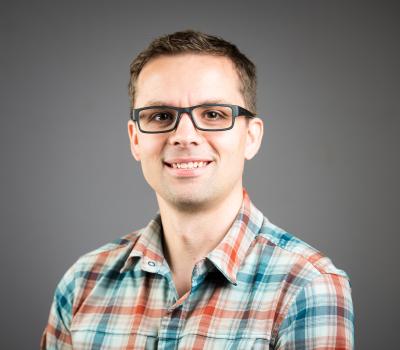
Computer science grabbed Mike Rosulek’s imagination early on, and at the age of 7 years he was already writing a UFO adventure game. He had the advantage of growing up in a technical household. In fact, his family home was connected to the internet before there was a World Wide Web.
It is perhaps surprising considering he lived in the small town of Fredericksburg, Iowa (population 925) “the dairy capital of Iowa, according to the sign,” Rosulek said.
But computers were a hobby for his father who, although he worked as a minister, was the de facto tech support for the whole town and eventually became a network administrator for the local community college.
Before starting a computer science degree at Iowa State University, Rosulek was essentially self-taught and remembers one of his big Christmas presents in 8th grade was the newest version of Visual Basic.
After graduation, Rosulek continued on to graduate school in computer science at University of Illinois, but by his second year he hadn’t yet found a line of research that interested him. Indeed, he had filled out the paperwork to leave graduate school when he was convinced to stay by a professor who thought he might be interested in the work of a newly hired faculty member who studied cryptography.
“It worked out really well,” Rosulek said. “Cryptography is full of amazing things … it was mind blowing to me. I wanted to know how it worked.”
He describes cryptography as taking problems that are really hard for computers to solve and using them to create robust security systems.
“It’s like making lemonade from lemons,” he said. “The lemons are that we don’t have efficient ways to solve these problems, and the lemonade is that we can turn it around so that if the bad guy wants to break our system he has to solve one of these really hard problems.”
Currently, he is working on secure computation which is the idea that you can make calculations on sensitive data without actually looking at the data. One application could be a research study across several hospitals that cannot share patient data but can submit encrypted data to a secure common location where it is analyzed. Although he has been working mostly at the theory level, Rosulek said he is moving toward applied uses for his work.
“This research has to get out into the real world, because it's so important and we know that people out there are will have amazing uses for secure computation. It’s just that right now it is computationally expensive. It takes a long time to perform these operations securely, so it’s not yet practical,” he said.
Rosulek started his career at University of Montana and arrived at Oregon State in 2013. As the first member of the security group in the School of Electrical Engineering and Computer Science, Rosulek discovered the students were “chomping at the bit” to have opportunities in the area of security. Before even arriving on campus he received emails from students about security courses and clubs.
“I’ve found the students here to be really sharp. They were able to take any hard problem I could throw at them and eat it up, so I was very pleased. I get to teach right in my sweet spot, so I find it easy to get excited about the material and students get excited too, so everyone has fun,” he said.
Although Rosulek’s two young girls keep him busy enough to not have much time for hobbies, he enjoys creative outlets like playing guitar, singing and photography. And although he likes being able to ride his bike to work year round in Corvallis, he misses snow which was the main subject of his minimalist landscape photography — stark snow scenes with dark trees set against them.
“The work that I do is often proving that something is impossible, but I also like creating something more tangible and I think that's why I like the artistic outlets of music and photography,” Rosulek said.

